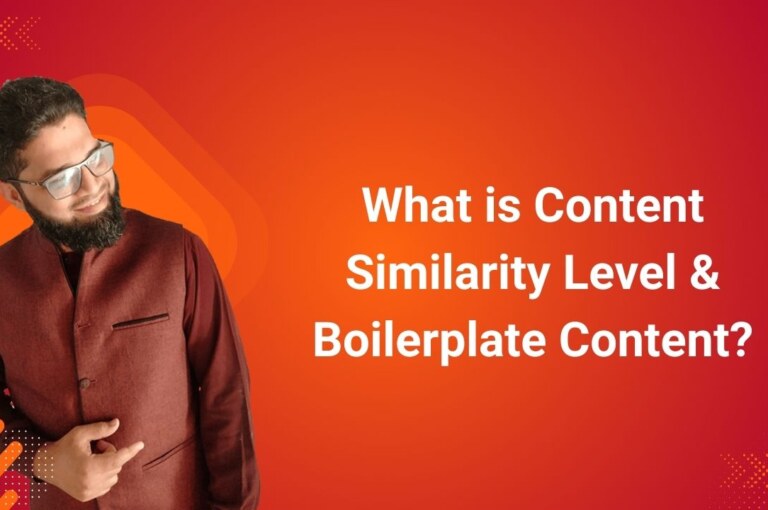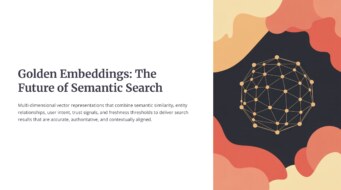Content Similarity Level refers to the degree to which two or more documents resemble one another, either lexically (same words) or semantically (same meaning).
In modern information retrieval, search engines evaluate similarity through multiple signals:
Lexical Analysis — exact word and phrase overlap.
Semantic Analysis — similarity of meaning across different wording.
Embedding Comparisons — vectorized representations of content that map meaning in multi-dimensional space.
These methods collectively determine whether content is unique, near-duplicate, or plagiarized.
Search engines rely on semantic similarity to compare documents based on meaning rather than surface form. The closer two pages are in this vector space, the higher their similarity level. To visualize this, think of an entity graph where entities are nodes and shared relations create semantic proximity.
High similarity can indicate duplication or syndication; low similarity implies originality and contextual differentiation — essential for building topical authority.
How Search Engines Measure Content Similarity
Modern search systems use hybrid models that combine symbolic, statistical, and neural approaches:
Token and Phrase Matching – using techniques such as sliding-window analysis to detect overlapping sequences.
Vector Embeddings – contextual models like BERT, Sentence-BERT, or OpenAI’s latest LLMs compute meaning embeddings and compare cosine similarity scores.
Document Fingerprinting – hashing methods that identify near-duplicates through shingles or n-gram signatures.
Entity and Predicate Mapping – aligning entities and relationships within a structured knowledge graph to detect semantic redundancy.
Similarity thresholds vary, but many detection systems (e.g., plagiarism detectors, deduplication crawlers) treat a similarity score above 30 % as potential duplication.
From an SEO standpoint, measuring similarity is also part of query optimization pipelines. Search engines normalize and cluster pages that answer the same intent, keeping only the most authoritative result in the index.
Understanding Boilerplate Content
Boilerplate Content is standardized text that appears across multiple pages or documents with little to no modification. Examples include:
Legal disclaimers, cookie notices, and privacy statements.
Footer text and copyright information.
Repeated author bios or “About Us” blurbs.
Product templates or location descriptions reused across a site.
The term originates from the metal plates once used to print syndicated material — the same concept applies digitally when text is stamped across pages.
From an SEO perspective, boilerplate sections are treated as low-information areas. Google’s crawlers learn to separate unique from repetitive regions through algorithms similar to those used in information retrieval. While necessary for UX and compliance, excessive boilerplate dilutes unique signals, reducing the update score and overall crawl efficiency.
To prevent that dilution, each boilerplate block should remain lightweight and functionally distinct, allowing crawlers to focus on valuable main content.
Why Content Similarity and Boilerplate Matter for SEO
Search engines prioritize original, intent-satisfying information. When multiple URLs share high similarity, only one is indexed as canonical, while others may be ignored or merged. This impacts:
Crawl Budget — repetitive pages consume resources that could index new material.
Link Equity Distribution — backlinks get split among duplicates, weakening the ranking signal.
Keyword Cannibalization — multiple similar pages targeting the same intent compete internally.
E-E-A-T Signals — unique insights strengthen experience, expertise, authority, and trust, the foundation of Google’s E-A-T framework.
For instance, if an e-commerce site copies product descriptions from manufacturers, Google may canonicalize one version and omit the rest. Conversely, rewriting each description with contextual richness and semantic relevance reinforces both topical depth and brand credibility.
Search engines evaluate the “content fingerprint” at paragraph, sentence, and entity levels. Even semantically equivalent paraphrasing may be flagged if it fails to contribute new value. Therefore, maintaining an optimal content similarity level—not too low (consistency loss) and not too high (duplication)—is key to ranking stability.
Levels of Content Similarity in Practice
| Similarity Level | Description | SEO Impact |
|---|---|---|
| Unique Content | Fully original, adds new information and context. | Strengthens topical authority and improves visibility. |
| Partially Similar Content | Shares concepts or structure but recontextualized. | Moderate risk; may still rank if intent is distinct. |
| Highly Similar Content | Near-duplicate or replicated across pages. | High risk of canonicalization or de-indexing. |
This gradient is dynamic; updates, internal links, and freshness signals can shift how search engines interpret relevance. Maintaining a consistent content publishing frequency while introducing new semantic layers keeps your corpus evolving rather than repeating.
Diagnosing and Auditing Similarity Issues
Regular content audits help identify both excessive boilerplate and high overlap. Recommended steps include:
Run a Similarity Scan – use AI-based tools to assess semantic similarity beyond keyword matching.
Analyze Canonical Clusters – verify which URLs Google selects as canonical using Search Console.
Review Internal Links – strengthen navigation to unique nodes following your semantic content network.
Segment Templates from Unique Sections – isolate headers, footers, and disclaimers in separate includes.
Monitor Update Score and Freshness – ensure each page carries unique context and recent updates.
Through periodic analysis, webmasters can preserve semantic diversity while retaining structural coherence.
How to Fix High Content Similarity & Boilerplate Issues
Managing high similarity or excessive boilerplate isn’t about removing everything that repeats — it’s about controlling semantic redundancy while amplifying meaningful uniqueness.
Here are the most effective strategies:
1. Use Canonical Tags and Consolidation
Implement the rel="canonical" tag to indicate the preferred version of a page. Canonicalization tells search engines which URL carries the authoritative signal, helping with ranking signal consolidation.
Complement this with topical consolidation — merging similar pages into a unified, semantically complete resource that resolves overlap and strengthens contextual hierarchy.
2. Optimize Internal Linking
Strategic internal links guide crawlers and users toward your most valuable, context-rich nodes. A strong contextual flow prevents content isolation and ensures that boilerplate sections do not absorb unnecessary authority.
By linking semantically related content — such as connecting “duplicate content handling” with “query rewriting” or “query optimization” — you improve the semantic relevance of the entire content network.
3. Rewrite Duplicate Templates with Semantic Variation
Rephrasing is not enough. Search engines analyze meaning, not just words. Rewrite overlapping text by:
Introducing new entities or examples.
Expanding topical depth with related contextual subtopics.
Embedding location or audience-specific modifiers for local SEO.
This technique enhances contextual coverage — ensuring that each page provides distinct semantic signals.
4. Reduce Excess Boilerplate Sections
Evaluate how much non-unique text exists across templates. Remove repetitive paragraphs from product, service, or location pages and move them into centralized resources (e.g., about pages or help hubs).
Maintain essential usability text (like policies) but avoid keyword stuffing or repeating promotional claims — Google now filters this via quality signals and E-E-A-T alignment checks.
5. Use Dynamic and Personalized Content Blocks
With modern CMS and vector databases, websites can inject personalized snippets or dynamic elements to reduce repetition.
Combining semantic indexing with content personalization ensures that similar templates still deliver unique contextual experiences for users and crawlers alike.
The Role of Semantic Search & AI in Content Deduplication
Search engines now evaluate content similarity using contextual embeddings rather than strict keyword matching.
Advanced models like BERT, DPR, and Learning-to-Rank (LTR) systems analyze how well a page aligns with user intent, not just textual variation. This is part of Google’s ongoing shift toward semantic search engines that rank by meaning density and entity alignment.
AI’s understanding of boilerplate also evolved: modern algorithms automatically isolate recurring layout content from main content through DOM-based segmentation and information retrieval heuristics. That’s why adding more text no longer guarantees uniqueness — semantic differentiation does.
Future-ready content creators use knowledge-based trust and entity validation to make repeated sections credible rather than redundant.
The Future of Content Similarity in an AI-Generated Web
By 2025, large-scale content generation through AI has blurred the line between “original” and “derived.” To keep your site authoritative:
Build content around structured entities defined via Schema.org markup.
Leverage ontology alignment so your data connects coherently across platforms.
Maintain editorial voice consistency — a signal Google uses in evaluating trust and expertise.
Regularly refresh factual data and update semantic relationships to enhance update score.
Search engines are training on massive knowledge graphs; if your content doesn’t evolve semantically, it risks falling into “semantic redundancy zones,” where it is recognized but deprioritized.
The next evolution will likely include contextual content fingerprinting — measuring not just duplication but the novelty quotient of semantic clusters.
Final Thoughts on Content Similarity & Boilerplate Content
In semantic SEO, uniqueness isn’t just about avoiding plagiarism — it’s about adding new meaning to existing knowledge graphs.
Content similarity level measures how closely pages resemble one another in structure, language, and semantic interpretation.
Boilerplate content, while necessary for user consistency, must be managed to prevent dilution of topical authority.
The best strategy blends structured uniformity with contextual innovation — ensuring every page contributes new insights to your digital ecosystem.
By understanding semantic similarity, entity salience, and contextual flow, you’ll create a content network that is both coherent and algorithmically unique — the foundation of modern visibility.
Frequently Asked Questions (FAQs)
How much content similarity is acceptable for SEO?
Generally, keeping similarity below 25-30 % is considered safe, but semantic overlap matters more than raw percentage. Pages must deliver unique intent and entity value.
Does boilerplate content always hurt SEO?
No. Boilerplate content is essential for structure, but excessive repetition in main content areas weakens topical authority. Use canonical tags and consolidate where possible.
Can AI-generated text increase duplication risk?
Yes — many LLMs paraphrase the same public data. Using query rewriting, entity enrichment, and editorial review can prevent semantic duplication.
How do I check my site’s similarity level?
Use NLP-based similarity tools or your own vector database indexing to compare embeddings across pages. Combine with manual audits for contextual overlap.
Is boilerplate treated differently by Google?
Yes. Google isolates navigation, footer, and templated text to focus on the unique body content. That’s why well-structured boilerplate isn’t penalized — it’s just de-weighted.
Want to Go Deeper into SEO?
Explore more from my SEO knowledge base:
▪️ SEO & Content Marketing Hub — Learn how content builds authority and visibility
▪️ Search Engine Semantics Hub — A resource on entities, meaning, and search intent
▪️ Join My SEO Academy — Step-by-step guidance for beginners to advanced learners
Whether you’re learning, growing, or scaling, you’ll find everything you need to build real SEO skills.
Feeling stuck with your SEO strategy?
If you’re unclear on next steps, I’m offering a free one-on-one audit session to help and let’s get you moving forward.
Table of Contents
Toggle




Leave a comment